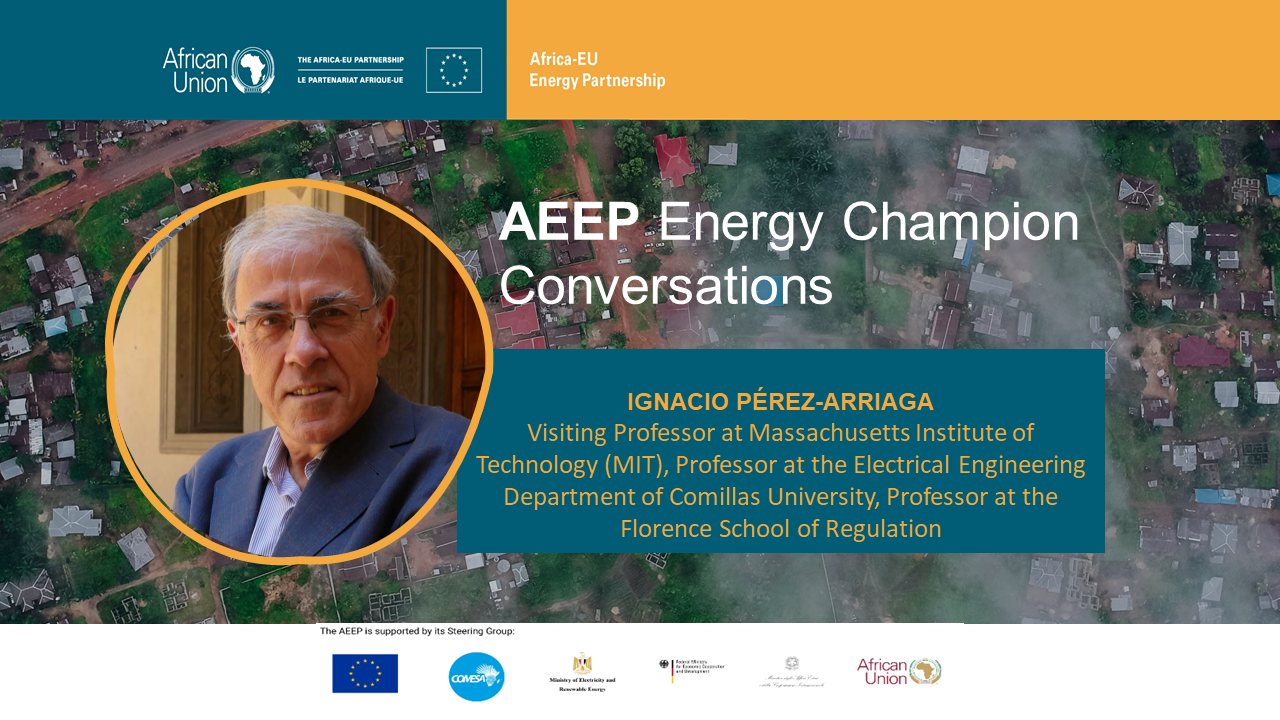AEEP Energy Champion Conversations: Ignacio J. Pérez-Arriaga

The AEEP Energy Champion Conversations is a series of interviews that highlight the work of inspirational energy experts in Africa and Europe. We meet passionate promoters of a sustainable energy transition and hear their insights on the biggest achievements so far and most pressing challenges ahead.
Universal access to clean, appropriate and affordable energy is a prerequisite for well-being and economic development as envisioned by the UN 2030 Agenda for Sustainable Development, the UN Paris Agreement on Climate Change, the African Union’s Agenda 2063 and the EU’s Comprehensive Strategy with Africa.
As the gateway for joint action on a green energy future, the Africa-EU Energy Partnership (AEEP), in this series accentuates visions of key energy actors on how to achieve universal access to affordable, sustainable and modern energy services in Africa.
IGNACIO J. PÉREZ-ARRIAGA, Visiting Professor at Massachusetts Institute of Technology (MIT), Professor at the Electrical Engineering Department of Comillas University, Professor at the Florence School of Regulation
1. When, how and why did you start to work for a sustainable energy future?
It has been a slow and long process, which is maturing now as I am in my 70s. I have been concerned with environmental issues since I was a student. I studied engineering but at that time I could not find the instruments to put my concerns into practice. Now, I am an academic, a professor, an energy regulator, I do consultancy and I do research. In an indirect way, for many years, I tried to show in my classes on regulation that I cared about these issues. And, for example, I tried to promote initiatives towards cleaner and more efficient energies through the design of a programme on demand response in collaboration with environmental NGOs, which was approved by the Government.
20 years ago, I launched an initiative inviting the faculty in my engineering school in Spain to include sustainability topics in all the subjects that the taught. I was also appointed director of the BP Chair on Sustainable Development, which I held for 15 years. It gave me total freedom to develop my ideas despite the sponsor being a fossil fuel company. I am a member of the Spanish Royal Academy of Engineering and I promoted and was the editor of two studies, one on sustainability of the transport sector and one on technologies for human development of isolated rural communities in developing counties. In my opening speech at the Royal Academy, I spoke about energy and sustainability and I pledged to devote as much time as possible to these topics.
It was when I moved to MIT in 2008 that I started to touch the ground and was able to put all these ideas into practice. Funded by the MIT Tata Center, I started a project on electrification in India about 11 years ago. I also launched a student group at MIT called Energy for Human Development that still meets regularly to discuss these topics. These electrification efforts kept growing and now I am devoted to full time to them. About six years ago I was funded by the Shell Foundation to investigate on what could be an energy company of the future in Sub-Saharan Africa. Later I have been funded by the Rockefeller Foundation on finding ways to accelerate electrification, especially in Africa. Today, I teach courses at MIT and at the Florence School of Regulation on regulation for SDG7, so all these initiatives have been growing and growing and most recently I have been involved in an interesting initiative to create an African School of Regulation.
2. Tell us about some of the most successful steps that you have been involved in so far to achieve sustainable, affordable and modern energy for all in Africa?
It is not clear how successful the things that I have tried have been. My premise has always been to think big. The problems of access to energy and moving towards a more sustainable energy system are so huge that although I am happy to see small initiatives, the solutions to these problems must be commensurate with the size of the problem. My initiatives have always been on this level and therefore it’s difficult to see how successful they have been.
I wear two overlapping hats. I’m an engineer, and as an engineer I have been developing and promoting software and doing projects on electrification planning, blending the three modes of electrification – grid extension, minigrids and stand-alone systems – trying to achieve least-cost solutions at a country level.
The other hat is my expertise in regulation. I have tried to develop regulatory and business models to accelerate electrification. My research team works on an approach called integrated distribution framework that focuses on improving electricity supply during the last mile, as close as possible to the end customer. But, as with students – you never know where investigating new ideas will lead to. You teach students something, but you don’t know how they will use the knowledge later. I am proud of participating in the African School of Regulation initiative. I was one of the founders of the Florence School of Regulation 18 years ago and now we have a solid institution that is teaching regulation to many people. We plan to do the same in Africa and if it is successful that is my contribution.
3. Africa and Europe have an established and dedicated partnership on energy. What do you see as the particular strength of this partnership? If we had an initiative to intensify and accelerate that partnership’s impact, what would be your aspirations for such a framework?
Obviously, Africa and Europe must be partners, we are so close, and we need each other. Firstly, due to migration. The standard of living in Europe attracts lots of people and the African population is growing fast. The only way to slow population growth is to stabilise people in their own countries through economic and human development and that requires energy, which must be clean because of climate change. This is a major topic in which both continents are involved, and we have to address this issue.
Secondly, there are huge business opportunities in Africa, which must be realised in a sustainable way. The third dimension is capacity building. We have overcome many problems while developing our power sector in Europe. Things cannot be copied and pasted, but there is lots of expertise, for example, on how to build a regional electricity marker, that can be passed on to Africa or interacted to be adapted in the African context.
In terms of accelerated partnership, capacity building and the African School of Regulation is an initiative that is trying to bring the instruments and best practices in energy regulation to the context of Africa, done by Africans, but with support and in interaction with Europe, and this is a major contribution.
4. How do we ensure that the shift away from fossil fuels to sustainable energy solutions happens in a just way that includes even the most marginalised groups in society?
This is a difficult question that many people are struggling with, and I cannot claim that I have a solution. The first premise is that Africa and Sub-Saharan Africa have the right to develop economically and industrially, and this requires lots of energy. The development should be done in a reasonably clean way, but we Europeans burn Nigerian gas in our power plants, we have built our industries and infrastructure using fossil fuels, so we cannot request that Africa does not do the same. Fortunately, renewable energy technologies have become competitive with fossil fuel technologies, but we still need those fossil fuel technologies to mix with the intermittent or variable nature of renewable sources like solar and wind to have a manageable power sector. We need a blend that should be as clean as possible, but we, the Europeans – among other nations – who provide funding to African countries, do not have the right to demand that everything should be renewable.
Reaching the most marginalised groups in Africa will require lots of off-grid solutions, which are mostly based on renewables. If we want a decarbonised economy, it means an electrified economy. We cannot continue cooking with biomass or with natural gas and cannot have all those motorbikes in African villages running on gasoline by 2050. The entire economy must be electrified and that requires robust connection. It requires that the minigrids and stand-alone systems reach everyone. The mix of upstream must be as clean as possible and fortunately all these distributed resources can be connected to the grid and most of them will, eventually. We must think a lot about the extension of the grid, the last mile and that the distribution utilities become financially viable and well regulated.
5. What motivates you to keep pushing for a clean energy transition?
I’m 73 and I keep going. I must say, humbly, that as visiting professor at MIT, professor at Comillas University and director of the training activities at the Florence School of Regulation, with a research team funded by Rockefeller Foundation to accelerate electrification and as an experienced regulator with excellent contacts and, so far, a good health, I am now in a good position to make a contribution, to find and communicate actionable regulatory and business models and finance approaches to accelerate access to energy. Considering all of this, I think I must do it. Also, it is fun. I love puzzles and this is a tough one.
Ignacio J. Pérez-Arriaga has a MS and PhD in Electrical Engineering from the Massachusetts Institute of Technology (MIT), and Electrical Engineer from Comillas University in Madrid, Spain. He is currently an invited professor at MIT, and professor at the Electrical Engineering Department of Comillas University. Additionally, he directs the training activities at the Florence School of Regulation, with a focus on FSR Global.
Pérez-Arriaga has advised governments and companies and taught power sector regulation for more than 30 years in over 40 countries around the world. He has been member of the board of the Spanish Electricity Regulatory Commission and the Single Electricity Market Committee in Ireland. He is a Life Member of the Spanish Royal Academy of Engineering and served for 5 years as a member of the Board of Appeal of the Agency for the Coordination of Energy Regulators (ACER) in the EU. Currently he is researching future trends in power systems, electrification planning in developing countries, and regulatory and business model approaches to universal energy access.
Read the interviews with Safiatou Alzouma Nouhou and Saliem Fakir.





